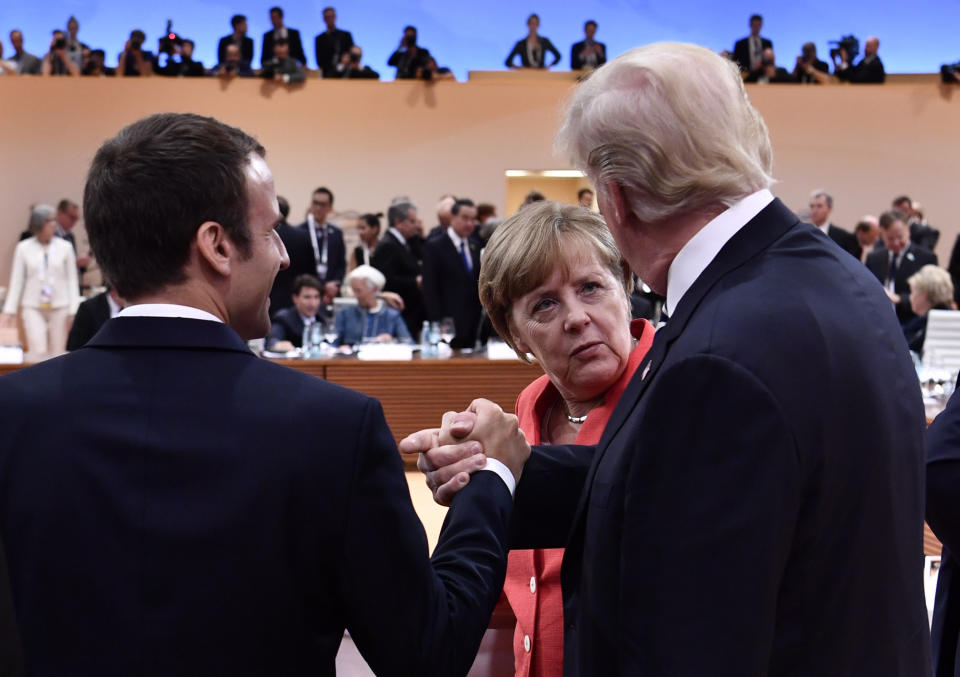Top GOP Senator Hopes Macron And Merkel Convince Trump To Save Iran Deal
WASHINGTON ― With weeks to go before President Donald Trump is expected to torpedo the nuclear agreement between Iran, the United States and five world powers, Senate Foreign Relations Committee Chairman Bob Corker (R-Tenn.) sees a small chance the landmark deal might survive.
“If nothing changes between now and May 12, the president absolutely is going to withdraw from the agreement ... I still hold out a degree of hope that when [French President Emmanuel] Macron and [German Chancellor Angela] Merkel are here, maybe there’s something, there’s a little bit of a breakthrough,” Corker said Wednesday morning, referring to upcoming visits by the two world leaders. While Macron has had an April 24 state visit to Washington planned for some time, the White House only announced Merkel’s April 27 visit on Wednesday, hours before Corker’s remarks.
Trump has to decide by May 12 whether he will continue to waive nuclear-related American sanctions on Iran. He has indicated that he will reimpose the sanctions unless the two-year-old deal ― under which Iran is allowed some sanctions relief and a partial reentry to the global economy in return for accepting limits on its nuclear development ― is modified.
In particular, he wants the deal amended to address Iran’s testing of ballistic missiles, tighten international inspections of Iranian facilities and prevent the removal of limits on the Iranian nuclear program in as early as 10 years’ time ― what are known as “sunset” clauses. The Islamic Republic is already complying with the deal as it currently stands, according to inspectors with the International Atomic Energy Agency, the international body tasked with monitoring compliance.
France, Germany and the United Kingdom are the closest American partners involved in the agreement; the other two parties are Russia and China. The Europeans have the best chance to woo Trump and keep the deal alive but have repeatedly said they will not accept tweaks that totally reshape it. They see such a process as requiring fresh negotiations or essentially destroying the accord automatically by making it unlikely that Iran would stay in.
The question now is whether European leaders can give Trump enough assurances to keep him from suspending the sanctions.
European officials are happy to develop plans to address Trump’s concerns on the missiles and the inspectors, Corker said. The trouble is the “sunset” aspect.
“I think it’s especially Germany that feels like dealing with the sunset is changing the deal,” the senator said at a Christian Science Monitor breakfast event. “I don’t.” Lawyers Corker has consulted agree with him and so do European officials behind closed doors, he claimed, implying they would not say so publicly for fear of criticism at home from supporters of the deal.
European companies have been eager to keep the deal in place and do business in Iran. If Trump does decide to re-apply U.S. sanctions in May, such companies would immediately be affected, Corker noted, because American enforcement applies not just to the Iranians but to those working with them.
With White House help, the senator started working on legislation last year that would prevent the U.S. from honoring the “sunset” commitments if Iran progressed to a point where it could build a nuclear weapon in less than a year. But the bill made little progress and he said Wednesday that it would have to come after any agreements with the Europeans, because Democrats would not vote for it otherwise.
Experts supportive of the Iran deal say that regardless of the concerns, there are multiple restrictions and transparency requirements on Iran after the “sunset” period begins that would still make it hard for the country to begin developing a nuclear arsenal if it wanted to.

But it’s Trump’s view that matters. The president has reluctantly waived nuclear sanctions against Iran on three occasions and has repeatedly criticized the deal. Trump continues to hear criticism of it through his network of informal advisers like old friends and business associates, Corker said.
“There are many people that are arguing to the president: ‘Look, the investment in Iran that was expected [as a result of the sanctions relief] hasn’t really occurred yet, but it’s coming down the pipeline. If we pull out of this agreement, it’s going to stop it, we’re going to keep them weak,’” the senator said. “There are people that are arguing to him that that would be a better way, to keep them weak, keep them weak, and then try to renegotiate a deal. There are other people that are arguing something totally different.”
A sometime critic of Trump, the influential retiring lawmaker has both been harsh on Iran and vocal about the value of some kind of compromise on the nuclear issue.
“I think we’d be much better off as a nation if we could come up with a sunset agreement with the Europeans,” Corker said.
Love HuffPost? Become a founding member of HuffPost Plus today.
This article originally appeared on HuffPost.

